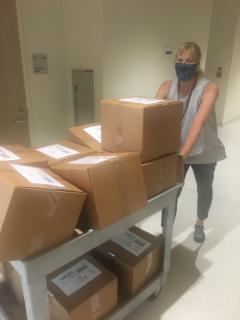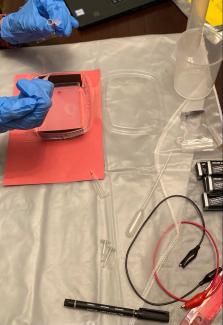When it’s time to complete her weekly biology laboratory experiment, junior Claire Baptiste clears off a table, spreads out an old cloth, and opens a bag containing the necessary components. These days as this is all happening at home in Arlington, Virginia, sometimes it becomes a family affair.
“I’m living with my parents and siblings right now,” says Baptiste. “One of my younger siblings is doing a science class. So we’re all used to having these science experiments set up on our table at this point. It’s weird how our behaviors have changed due to the pandemic.”
Occasionally enlisting her dad for help timing, Baptiste has conducted investigations of enzyme catalysis, photosynthesis, genetics, and more. “I’ve done research at Penn and have wet lab experiences, so I knew there were some things you couldn’t do outside of that lab setting,” adds Baptiste, a neuroscience major with minors in nutrition and chemistry. “And even though sometimes writing the lab reports is difficult, it’s definitely rewarding that you can still get that experience from doing labs that you would be doing on campus at your home.”

That approximation of the laboratory experience was precisely what Linda Robinson, instructional lab coordinator for Penn’s Department of Biology, and teaching colleagues were envisioning during the summer when they learned that undergraduate courses would be predominantly online in the fall semester. Learning from the experience of going online for summer courses, Robinson worked with fellow lab coordinator Karl Siegert to develop and assemble laboratory kits and instructional material. Together with technicians Svetlana Kozik and Sean McClain, as well as other helpers from the department, they ordered supplies and packaged 570 lab kits for students signed up for Biology 101, 102, and 123 this fall. Those kits were mailed to students, or made available for pick up for students living locally.
Read the Full Article on Penn Today

